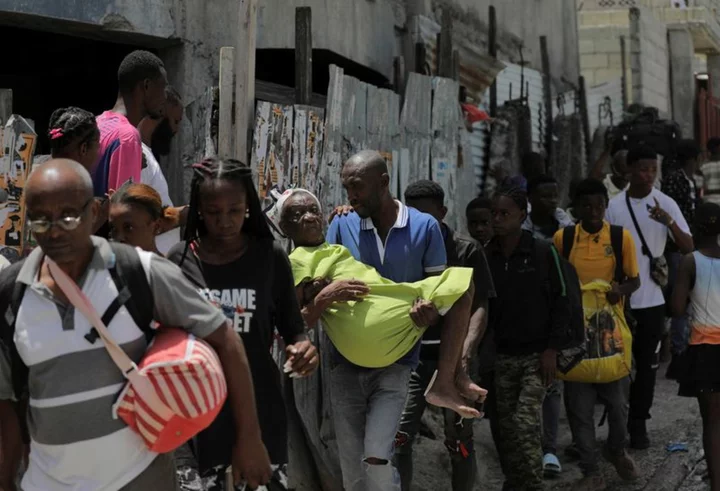By Michelle Nichols
UNITED NATIONS (Reuters) -A "robust use of force" by a multinational police deployment and use of military assets is needed to restore law and order in Haiti and disarm gangs, U.N. chief Antonio Guterres told the Security Council in a report seen by Reuters on Tuesday.
Haiti last year asked for international help to combat violent gangs that have largely overrun the capital Port-au-Prince. Guterres suggested in October that countries send a "rapid action force" to support Haiti's police.
The council last month encouraged countries to provide security support and asked Guterres to report within 30 days on a full range of U.N. options, including backing for a non-U.N. multinational force or a possible peacekeeping operation.
Guterres's report was circulated to the 15-member council on Tuesday and outlined two potential U.N. options: providing logistical support to a multinational force and Haiti's police and to strengthen a U.N. political mission already in Haiti.
"Haiti's current context is not conducive to peacekeeping," Guterres wrote, adding that law and order had to be restored, gangs disarmed, strategic installations and roadways secured and a state presence re-established to provide basic services.
"Nothing short of the robust use of force, complemented by a suite of non-kinetic measures, by a capable specialized multinational police force enabled by military assets, coordinated with the national police, would be able to achieve these objectives," said Guterres, who visited Haiti last month.
U.N. peacekeepers were deployed to Haiti in 2004 after a rebellion led to the ouster and exile of then-President Jean-Bertrand Aristide. Peacekeeping troops left in 2017 and were replaced by U.N. police, who left in 2019.
Haitians are wary of an armed U.N. presence. The Caribbean country was free of cholera until 2010, when U.N. peacekeepers dumped infected sewage into a river. More than 9,000 people died of the disease, and some 800,000 fell ill.
'ACT NOW' SAYS UN CHIEF
Guterres again appealed for countries to "act now" to contribute to the deployment of a non-U.N. multinational force and for the Security Council to support such a move. The United States has already said it is prepared to put forward a draft Security Council resolution to back a deployment.
Countries have been wary of supporting the unelected administration of Prime Minister Ariel Henry, who has said fair elections cannot be held with the current insecurity. Haiti has been without any elected representatives since January.
Kenya said last month it was ready to consider leading an international force and pledged to send 1,000 police officers. Kenyan officials are due to travel to Haiti soon to assess the needs for such a deployment. The Bahamas has since committed 150 people if the United Nations authorizes the force.
Guterres said Jamaica had also renewed its pledge to contribute to a force and he also welcomed announcements made by Antigua and Barbuda to consider contributing. He urged member states, particularly in the Americas, "to continue to build on this new momentum."
Guterres cited the "extreme violence" of gang attacks. "The capital is encircled by gangs and effectively cut off by road from the northern, southern and eastern parts of the country."
International security help should include safeguards to prevent abuses, Human Rights Watch said on Monday.
In his report, Guterres said any targeted operations against gangs must also protect people and respect human rights and due process.
(Reporting by Michelle Nichols; Editing by Ismail Shakil and Grant McCool)

